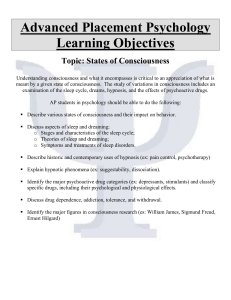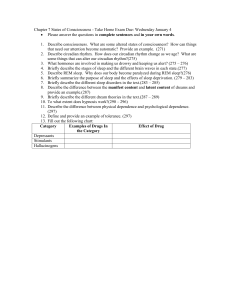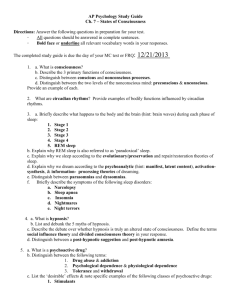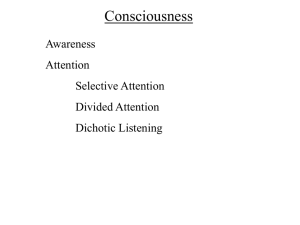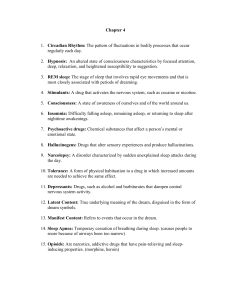Consciousness: Sleep, Dreams, Hypnosis, and Drugs
advertisement
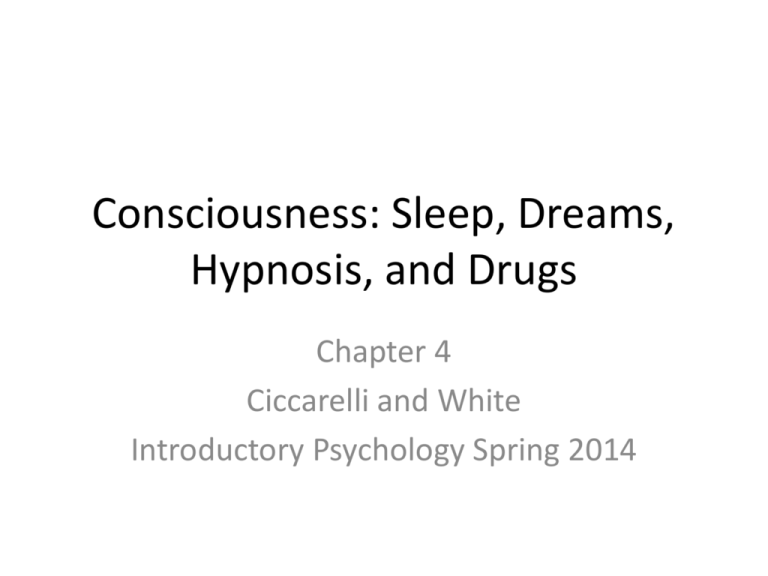
Consciousness: Sleep, Dreams, Hypnosis, and Drugs Chapter 4 Ciccarelli and White Introductory Psychology Spring 2014 What is Consciousness • Content Consciousness vs Phenomenal Consciousness • A person’s awareness of everything that is going on around him/her at any given moment, which is used to organize behavior • Waking Consciousness • Altered Consciousness • Trance Dancing video Theme/Process Description Universal ability Anyone can achieve AC through movement Movement as efficient route Movement was equal to or better than other methods for achieving AC Chemical substances Substances seem as less desirable tool for inducing AC (3 participants stated substances were equal to other tools for inducing AC) Active observer Active part of consciousness observing the experience Focus 1) Universal connectedness Connection to others, to the earth, or to a universal whole Super-consciousness Mindful presence that leads to feelings of expanded consciousness and heightened simultaneous awareness Energy Increased physical energy such that participants did not feel fatigued which seemed to be a component of an electromagnetic field or spiritual component through which participants felt connected to others Transcending the ego Overcoming the tendency to make judgments, giving up a sense of external control, and allowing oneself to feel vulnerable enough to proceed to the super-consciousness Increased self attributes Increased self-worth, confidence, self-esteem Increased acceptance Less judgmental of self and others Transformation of the self A self-concept that was somewhat spiritual and was not confined by physical reality Elevation Participants felt lifted Freedom Freedom related to overcoming judging mind Well-being Enhanced mental, physical, emotional health Spiritual experience The expressing of the energy discussed earlier; connecting to something larger than the transformed self Search for truth/reality ACIM as a way to find the meaning of existence Changed body relationship New physical abilities, more energy, changed body chemistry, elevation Ecstatic emotional experience Feelings of joy, love, happiness Community Felt in community with other dancers language Movement served to communicate with others Direction of focus, 2) active/passive, 3) self/others Altered State: Sleep • • • • • Circadian Rhythm Role of the Hypothalamus Sleep Deprivation Adaptive Theory of Sleep Restorative Theory of Sleep Stages of Sleep • • • • • • • • • REM and Non-REM sleep Beta Waves Alpha Waves Theta Waves Stage 1: Light Sleep: theta waves Stage 2: spindles Stage 3: Deep Sleep: Delta and Theta Waves Stage 4 : Deep Sleep: Delta Waves REM Sleep Sleep Disorders • • • • • • • Nightmares REM Behavior Disorder Stage 4 Sleep Disorders Night Terrors Insomnia Sleep Apnea Narcolepsy Dreams • • • • Freud Activation-Synthesis Hypothesis Activation-information mode model What do people dream about Hypnosis • What is Hypnosis • Fact or Myth • Theories of Hypnosis Psychoactive Drugs • • • • • • • Physical Dependence Psychological Dependence Stimulants Depressants Narcotics Hallucinogens Marijuana Stimulants • Amphetamines • Cocaine • Nicotine – Ad • Caffeine Depressants • Barbiturates • Benzodiazepines Alcohol • • • • Alcohol Abuse Korsakoff’s syndrome Fetal alcohol syndrome What constitutes a drink Narcotics • Opium • Morphine • Heroin Hallucinogens • • • • • LSD PCP MDMA Mescaline Psilocybin Marijuana • Cannabis Sativa • Hashish • Cannabinoid

